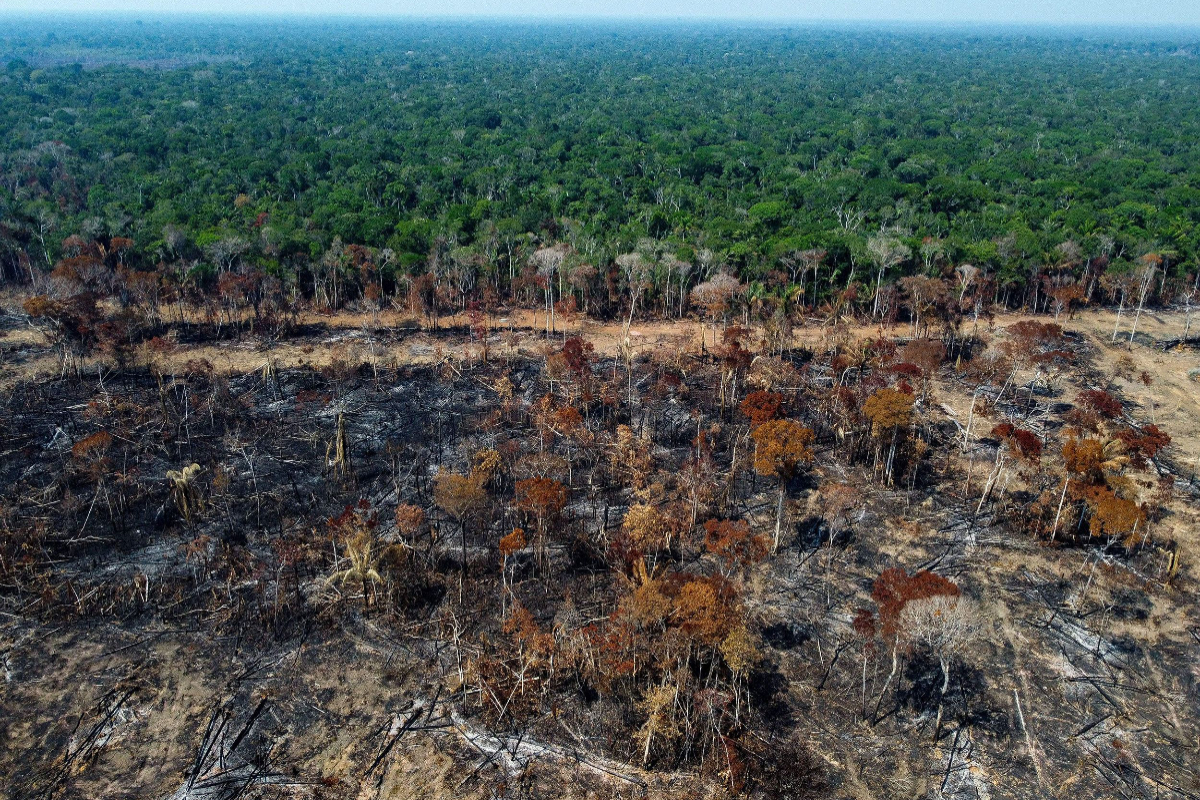- SOS Mata Atlântica CEO Luis Guedes Pinto shows how to restore Earth’s forests.
- The non-profit group is committed to restoring the expanse of forest along Brazil’s Atlantic coast.
- More than 145 million Brazilians live in the forest, which has lost a third of its area due to deforestation.
At the U.N. climate summit in Egypt on Wednesday, Brazilian President-elect Luiz Inácio Lula da Silva promised a crowded audience that, six weeks before taking office, his administration would crack down on illegal deforestation and catapult the continent’s biggest and most populous country to the forefront of climate leadership.
“This project doesn’t change a big landscape, but it shows it’s possible to bring back life, to bring back water, to bring back biodiversity, to the center of the state of Sao Paulo,” said Pinto, the CEO at SOS Mata Atlântica, as he pointed down to two square miles of forest restoration.
The non-profit group run by Pinto is committed to restoring the expanse of forest along Brazil’s Atlantic coast. More than 145 million Brazilians live in the forest, which has already lost around three-quarters of its original area due to aggressive farming practices, urban and infrastructure expansion, and deforestation, just like the Amazon rainforest has in recent years.
“We need to plant and replant, but we cannot lose another acre,” Pinto said as he guided media through a nursery with more than 50 species of carefully cultivated trees and plants in what was once degraded, drought-prone pasture. “A forest we replant is not going to be the same as a forest we cut down. Some of the forests we’re losing have trees in them that are hundreds of years old.”
These are the first sprouts of a recovering forest. It has developed into a thriving eco-lab with a healthy water table, trees, plants, and animals in just 15 years. The pasture region on its borders, where acres of what was once woodland have been taken over by drought-stricken grass, has an entirely different landscape.
Projects like these are currently at a crossroads of climate and political history in Brazil, a country that is home to one of the largest collections of biodiversity on the globe, as president-elect Lula Da Silva assumes office.
The administration of President Jair Bolsonaro has been accused for over four years of erasing the environmental advancements made by Lula, who presided from 2003 to 2010. According to data from Brazil’s National Institute for Space Research, from 2018 to 2021, the rate of deforestation increased by more than 70% under Bolsonaro’s administration.
In certain areas, the Amazon rainforest is already releasing more carbon dioxide than it is absorbing, a change that might have a significant negative impact on trends in global warming. The priceless rainforest, according to scientists, is also getting closer to a point of irreversible decline and is less able to bounce back from disturbances like drought, logging, and wildfires.
According to Lula’s presidential record, his administration was successful in drastically reducing deforestation rates by the time his term ended in 2010. His most recent pledge is even more ambitious: to stop all deforestation in Brazil. This would be much more ambitious than the previous administration’s aim to stop only illegal deforestation, not all forms of it.
[embedpost slug=”brazil-sets-concerning-new-deforestation-record-in-amazon/”]
However, Bolsonaro backers, who still hold control of congress, might make taking action on climate change far more challenging over the next four years. Ricardo Salles, who served as Bolsonaro’s environment minister before being recently elected as a legislator in Brazil’s congressional body with a conservative lean, is one of those allies.
Salles stated in a interview with media that he and others are prepared to collaborate with Lula’s future administration on addressing climate change, but he cautioned that this should not come at the expense of economic growth.
“I was the only guy as minister of environment in the entire history of the ministry who brought these economic questions to the table,” said Salles. During his time as environment minister, the Bolsonaro government often described development and economic activity in the Amazon as vital to long-term sustainability – an approach decried by many environmental activists in the country.
Salles claims that in order to access the billions of dollars in climate funding and carbon credits currently being offered by governments and businesses worldwide, Brazil will need to cooperate closely with its international partners.
However, environmentalists contend that neither Brazil nor the earth can afford the compromises that Bolsonaro backers are now calling for.
“We don’t need to destroy to develop. We can do that in harmony with nature. And it’s the indigenous peoples who teach that,” Brazilian indigenous leader Txai Suruí told media.
Suru asserted that despite economic pressure from Bolsonaro backers as well as millions of people in the Amazon whose livelihoods depend on its commercial growth, she is certain that Lula’s administration will follow through on its commitments to act promptly.
“Because that agenda — of the Amazon, of climate change, of the environment — it’s a global agenda,” she said. “If Lula does not address it, it won’t just be us, indigenous people, that will be knocking on his door, it’ll be the entire world.”
Pinto acknowledges the importance of committing to such objectives and claims that more than just Brazil’s future is at risk.
“We need to understand as a nation that is key for the planet and that decisions we will make will be important for us but also for others,” he says.





















